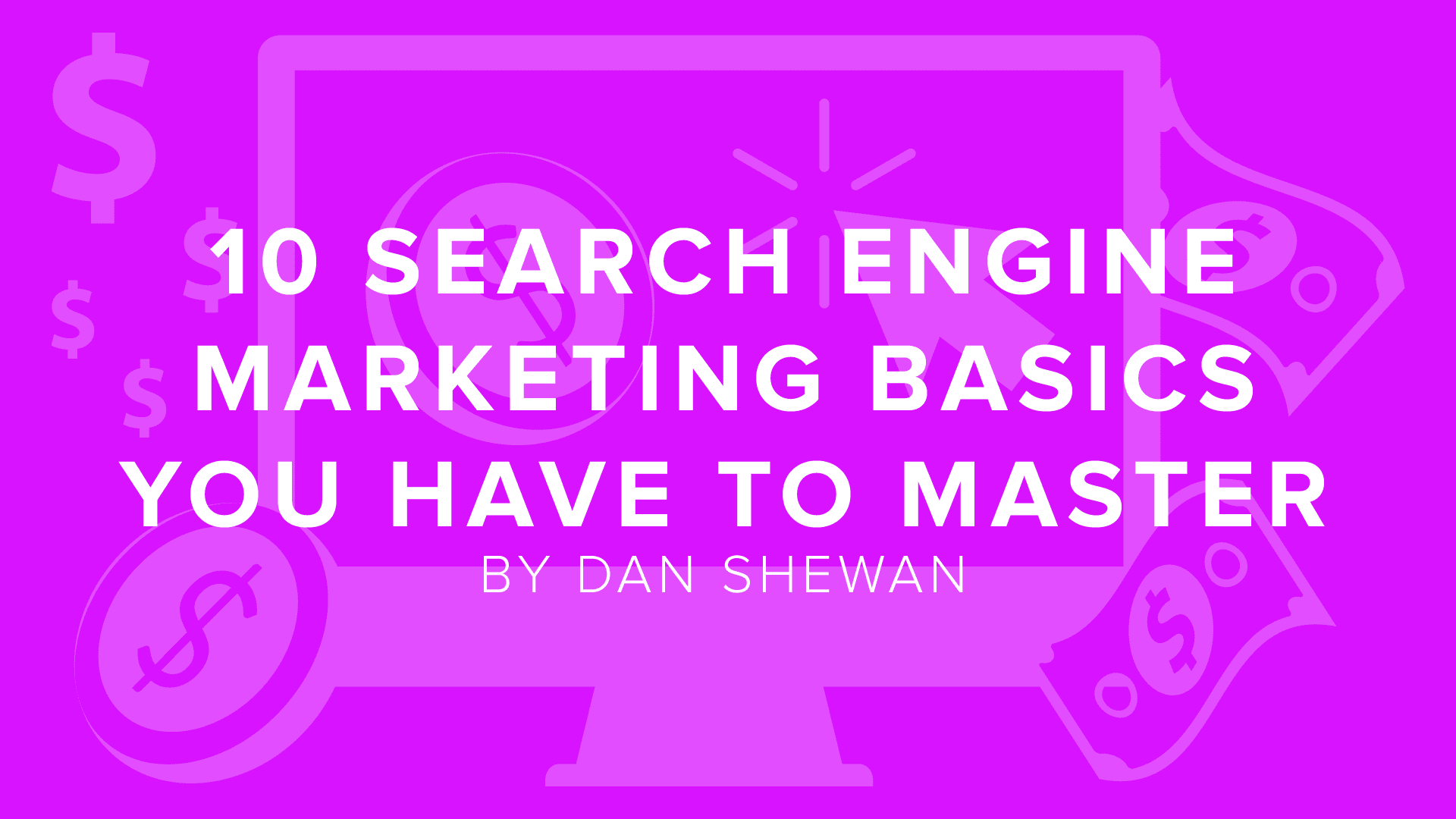
Search engine marketing is a little like chess. It’s relatively easy to grasp the basics, but it can take years to master.

Many instructional designers and eLearning professionals struggle with the marketing aspects of their online courses and businesses. There is such much to learn before you can successfully market your online courses and increase your course sales.
In this post, I’ll be covering 10 search engine marketing (SEM) basics that you’ll need to master in order to succeed as a digital marketer. By the time you’re done reading, you’ll be ready to get your feet wet in the world of search engine marketing, and will have a much better idea of the resources you’ll need to continue your learning journey. So let’s get started!
1. Pay-Per-Click Marketing Is Simpler Than You Think
When it comes to pay-per-click (commonly abbreviated to PPC) marketing, there are a lot of concepts to wrap your head around. However, the basic principles are pretty straightforward.
When getting started with PPC, it’s important to remember why it’s called pay-per-click advertising. Regardless of how much you bid on a keyword, you’ll pay each and every time someone clicks on one of your ads – whether that click results in a sale or not. That’s why it’s important to really understand how people search for things, and what they’re looking for when they click ads related to their search queries.
2. When It Comes to Keywords, Relevance Is Everything
One of the most common mistakes newcomers to search engine marketing make is going after the big, expensive “money” keywords exclusively. Not only can this be extremely expensive, it doesn’t always pay off.
Novice advertisers might think that these keywords are essential to the growth of their business, but that may not necessarily be the case. Think about user intent and make sure you’re targeting keywords that are relevant to searchers’ queries.
3. Think About Account Structure from the Beginning
It’s vital to think about account structure from the beginning. The more effort you put into planning your account structure, the less you’ll have to do later on. Poor account structure can have a significant impact on the performance of your ads, your return on investment, your click-through rates, and more.
Account structure is a complex topic and easily warrants its own post, but for now, let’s take a look at the optimal structure of a PPC account to visualize how to organize your campaigns:
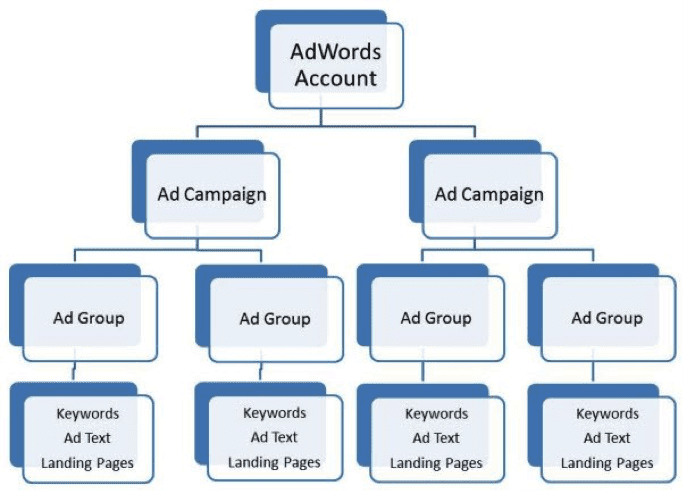
In this example, there are two active campaigns in this account. Each campaign has two ad groups, each of which has their own keywords, ad text, and landing pages.
However you choose to structure your account, think about it early on – don’t just throw something together and hope it’ll work out.
4. Spend Plenty of Time Creating Your Ads
The fourth search engine marketing basic you’ll need to master is writing good text ads. This might seem obvious, but you’d be amazed by how many terribly written ads are out there (some of which are triggered by those big, expensive money keywords we talked about).
Well-written ads can increase your click-through rates and persuade prospective customers that they need your services, even if they don’t realize it. The wording of your ads should promise a solution to your would-be customers’ problems, because that’s what people really want when they buy things.
Spend plenty of time crafting your ads, and don’t be tempted to cut corners.
5. Optimize for Click-Through Rate
Click-through rate, often abbreviated to CTR, is one of the most important metrics you can focus on in your PPC account. It impacts both your cost-per-click (CPC) and your Quality Score. It is possible to achieve better Ad Rank with lower bids if your Quality Scores are higher, making CTR a very important metric.
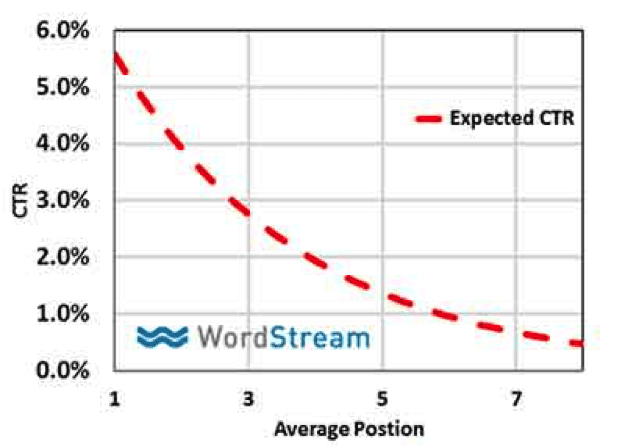
To optimize your ads for CTR, it’s essential to consider keyword relevance. Including strongly relevant keywords in your headlines and ad copy is a great place to start.
6. Pay Attention to Quality Score
Too many advertisers overlook the importance of Quality Score, but it’s one of the most revealing metrics when it comes to the overall health of your ads.
Quality Score can seem a little mysterious, especially to newcomers to AdWords, but the equation for how Quality Score is calculated is actually pretty simple:

Although the precise weight of each of these factors remains a closely guarded secret, we do know that higher Quality Scores mean higher ad rankings for less money. This means that the higher your Quality Score, the less you’ll have to bid to achieve a higher ad rank:
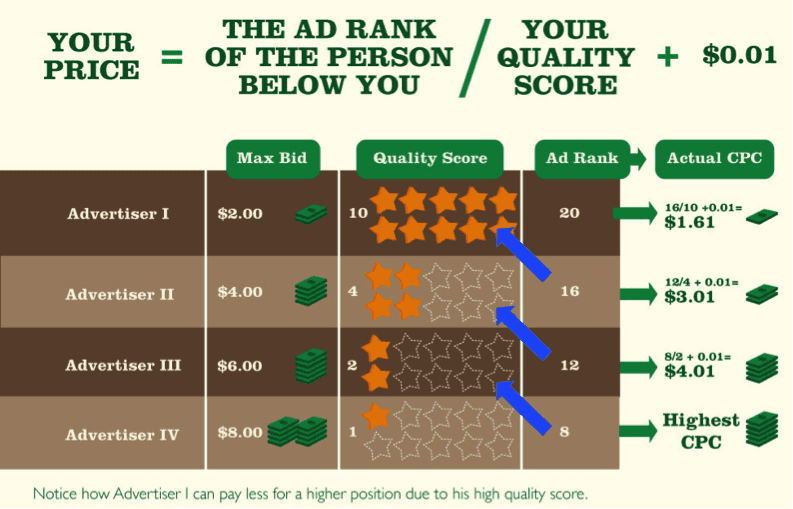
Quality Score is a complex topic, and one you should thoroughly understand as a PPC advertiser.
7. Understand Your Cost-Per-Action
A lot of newcomers to paid search get confused when it comes to cost-per-action, because it can also be referred to as cost-per-acquisition. Both use the abbreviation CPA, though, so keep this in mind.
Let’s say that for every 100 clicks, you get 50 conversions. This means your conversion rate is 50%. However, you still had to pay for the other 50 clicks that didn’t convert, meaning that the average CPA is often higher than your CPC, as not every click will result in a sale, a new lead, or however else you define a conversion.
Simply put, the higher your conversion rate, the lower your CPA will be.
8. Think About Conversion Rate Optimization
Conversion rate optimization, or CRO, is one of the hottest topics in digital marketing, and for good reason. The more highly optimized your campaigns are, the more effective they’ll be and you’ll spend less to grow your business.
Think of CRO as less of a series of specific tactics and more of a mindset. Is your ad text as compelling and relevant as possible? Are your landing pages designed to make it as easy as possible for visitors to convert? Is the overall messaging and positioning clear?
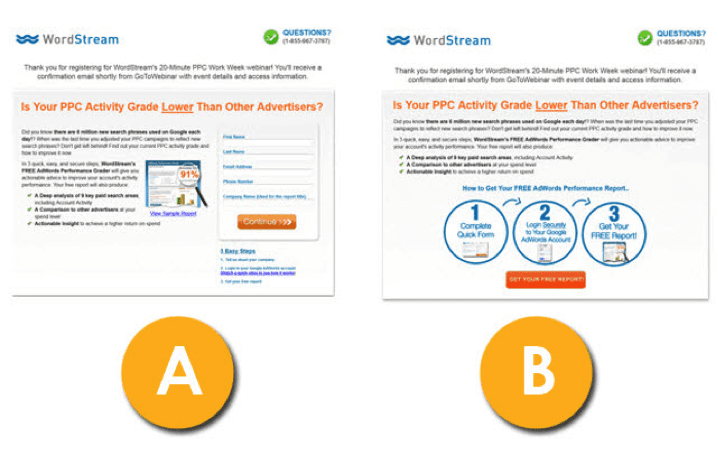
An important part of CRO is A/B testing. This is the practice of comparing the performance of two different versions of an ad, landing page or whatever else to see which one does better. Whenever possible, make decisions about your campaigns based on hard data, not assumptions.
9. Be Realistic, and Know Your Limits
One complaint we hear over and over again at WordStream is that AdWords is too expensive and doesn’t work for small business. This simply isn’t true – but you do need to manage your expectations and be realistic.
Mastering PPC takes time, effort, and perhaps most importantly, a willingness to experiment. Overnight success with AdWords is very rare, and it’s vital that you’re in it for the long haul, rather than a quick buck.
10. Never Stop Learning
Like many disciplines, learning paid search is an ongoing process. There will never be a point when you’re “done” learning PPC. Sure, the basic principles are likely to remain the same, but there are always new features, new strategies, and new approaches to learn and master.
Take charge of your digital marketing education and stay up-to-date with emerging trends and new technologies. Check out WordStream’s PPC University, read industry blogs, watch webinars, and attend conferences. The more time and effort you put into learning PPC, the more knowledgeable you’ll be and the better your chances of success.
Written by: Dan Shewan, WordStream
